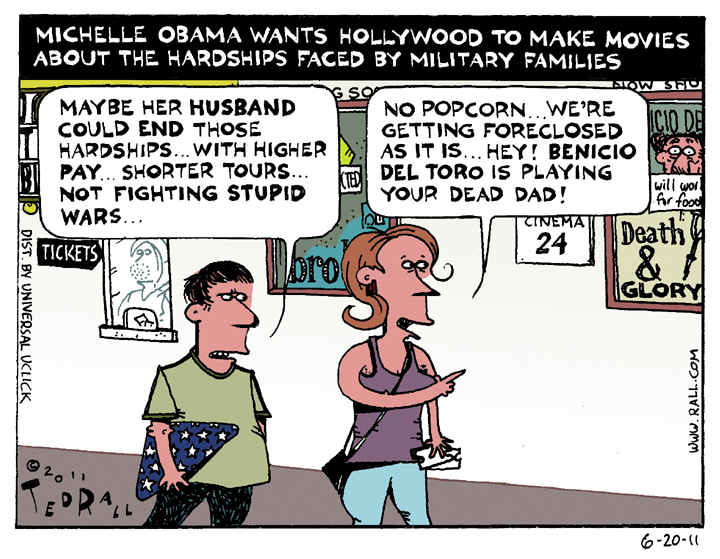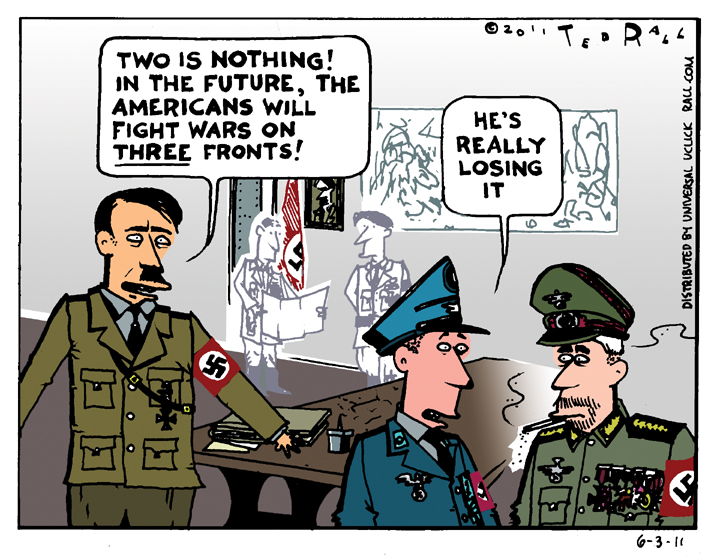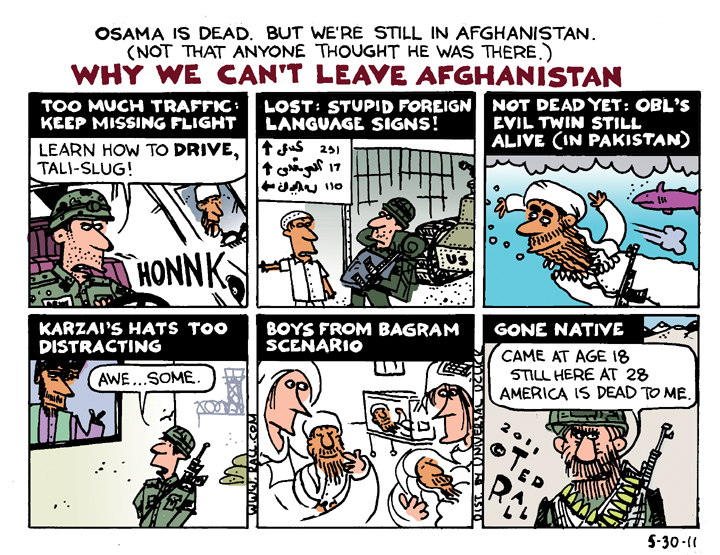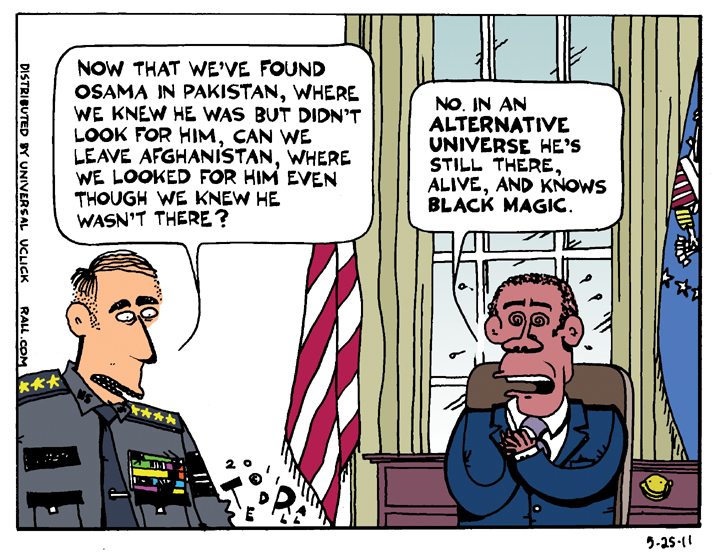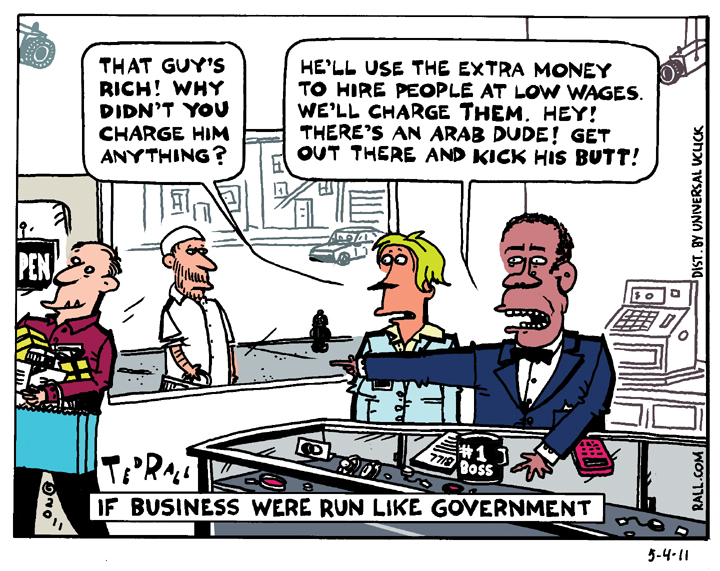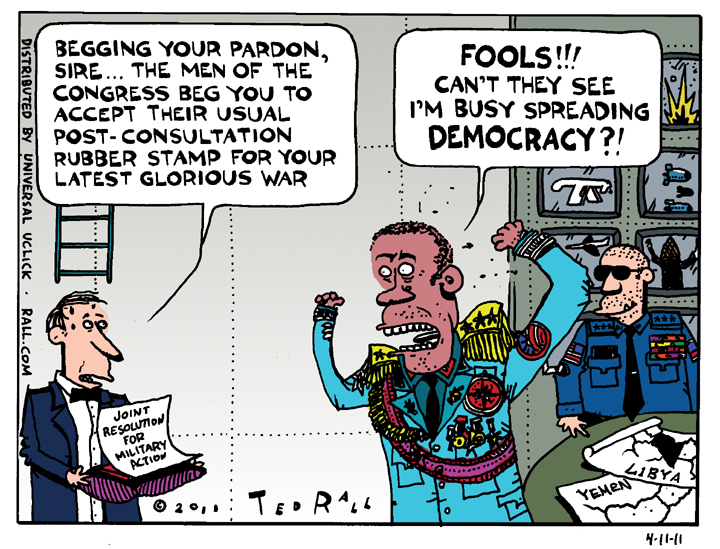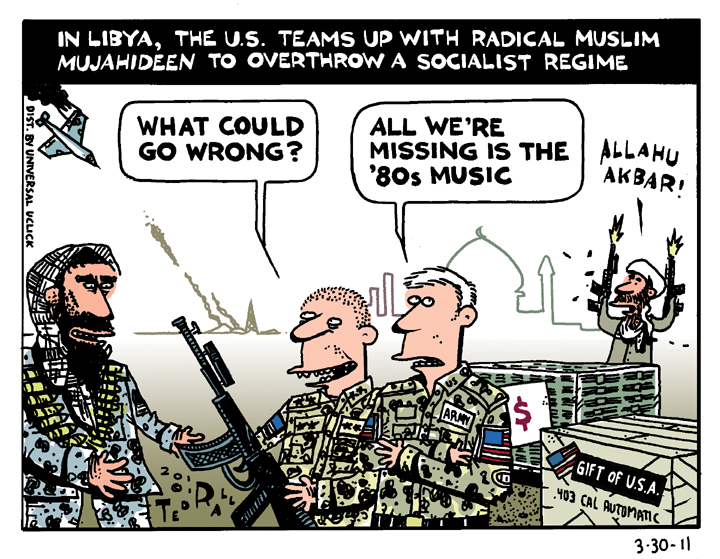Michelle Obama wants Hollywood to make movies about the hardships faced by military families. But her husband could stop or mitigate those hardships entirely.
SYNDICATED COLUMN: The Revolution Will Not Be Deactualized
Oct. 6th: Will Tahrir Square Come to Washington?
I used to work for Democratic candidates. I was a campus activist. I marched in protests.
But, in the 1980s, I quit politics. I was fed up. The Left was impotent and inept. They didn’t want to change things. They were content with theater. Bad theater at that: dorks on stilts, boring speakers, stupid slogans, the same old chants. “The people, united, will never be defeated!”
Except—we were defeated. We didn’t even fight.
Our protests were poorly attended. The media ignored us. And we always lost. Even the Democrats didn’t care about us or our opinions. By the time Bill Clinton won in 1992, the progressive wing of the party was good for one thing: voting Democratic.
Along with millions of others, I drifted away.
Now, finally, for the first time in decades, I am excited.
We can change everything. Here. In America. Now.
People are rising up in Tunisia, Egypt, Jordan and Syria. Patriotic Afghans, Iraqis and Yemenis are fighting puppet dictators propped by U.S. military occupation. They demand an end to violent, corrupt governments that serve themselves but not their citizens. People in the Middle East and European countries such as Greece refuse to accept systemic poverty and unemployment so that a tiny slice of corrupt, well-connected elites can continue to amass wealth.
Why just in other countries? Why not here?
Why can’t we have a Tahrir Square?
Lord knows we need one.
Here in the United States, corrupt politicians and their corporate overlords have raped the wealthiest nation in the history of civilization, reducing one out of five Americans to unemployment as the income of the rich skyrockets. They tell us our schoolchildren must do with less, that we cannot afford to see doctors when we are ill; meanwhile they start prolonged, seemingly endless wars of aggression against nations that posed no threat whatsoever: Afghanistan, Iraq, Libya, and now Yemen.
Did you know that Egypt and Tunisia had lower unemployment and disparity of income than the United States?
Organizers are calling a demonstration planned for October 6, 2011 in Washington’s Freedom Square “the biggest story on the progressive sphere of the Internet tomorrow.” October 6th marks the tenth anniversary of the U.S. invasion of Afghanistan.
This, they say, will not be the usual sad protest demonstration in which people show up, chant slogans, march around, then pack up their signs and go home.
[Full disclosure: I have endorsed October 6th and will attend.]
The idea behind October 6th is simple: to recreate Tahrir Square two blocks away from the White House.
“We are not packing up and leaving this time,” says Tarak Kauff, one of the October 6th organizers. “We are preparing to stay as long as we possibly can or until some basic demands are met. If we are driven out, we will return.”
In other words, clear your calendar for the 6th, the 7th, the 8th…however long it takes for the Obama Administration to yield to key demands, including immediate withdrawal of American troops from Afghanistan and the other wars. Participants are being asked to sign a pledge to attend at http://october2011.org.
“Previous demonstrations were one-day events which were simple for the Administration and Congress to ignore,” Margaret Flowers, another organizer, told me. “The large demonstrations usually happened on weekends when there was little going on in Washington. “This is different because it is an occupation that begins on a Thursday, a day of business, and will continue.”
They will keep the heat on. “We intend to stay and to have waves of nonviolent civil resistance. The time for symbolic actions has ended. Too many people are suffering and dying here and around the world because of the policies of this nation. The planet is suffering because of the policies of this nation. This government has demonstrated that it is incapable of acting in the best interests of the people and planet. We say that this is unacceptable and we will stay and resist until this changes,” Flowers said.
All the participating groups have pledged to remain nonviolent. However, it is not hard to imagine the Washington police or other state security apparatus reacting brutally to the occupation of part of downtown Washington by tens or even hundreds of thousands of people. Hoover crushed the Bonus Army. Antiwar demonstrators at the 1968 Democratic National Convention were beaten. Chinese authorities refused to tolerate the occupation of Tiananmen Square. We have seen dissent crushed in Iran, Bahrain and Syria.
A real demand for real change? The system will view that as a threat.
Flowers: “If the police respond violently, we will do our best to maintain a nonviolent response. If we responded with violence, it would reinforce the police violence and they have weapons, so more people would be hurt. We do not want that. It will be very unfortunate if the police and others working for the security state choose violence. But that is a possibility as we are seeing in this country and around the world. Empires have a history of violence. We want a different kind of society—one that is peaceful, just and sustainable. That is the kind of society we intend to model during our occupation.”
Unlike previous demonstrations, which tended to center around one issue like globalization or gay rights, October 6th is an attempt to unify the American Left into a holistic attack upon the main cause of most of the problems we face: the hegemony of big business that is the inevitable culmination of late-stage capitalism.
Tarak Kauff: “October 6 is…a call for people to stand up to, and resist the root cause not only of our global war-making for profit, but of near catastrophic ecological disaster, pollution, an austerity budget cuts that will devastate the poor and working class, lack of adequate health care and just about every social ill you can think of. What’s the root cause? You got it before I can say it. That’s right, the corporate state.”
October 6th has lit up the leftie blogosphere. If things come together, it could be The Big One: the major event that marks the beginning of the end of the two-party trap and a political system that extracts wealth from the poor and middle-class for the benefit of the wealthy.
Organizer Kevin Zeese adds: “I expect that we will be staying, and not just for the 7th and 8th. We will be working through various scenarios on what will happen depending on how the government responds. In similar events around the world there have been a range of actions and protesters have had to adjust depending on them. Our intent is to stay until we are satisfied with the response.”
“History is not a fairy tale you read to your children at night,” reads the mission statement. “It is not something someone else did in another place. History is right here and right now, in front of you.”
(Ted Rall is the author of “The Anti-American Manifesto.” His website is tedrall.com.)
COPYRIGHT 2011 TED RALL
SYNDICATED COLUMN: Osama bin Laden’s Ultimate Victory
Culturally Clueless and Politically Tonedeaf, U.S. Gave Bin Laden the Martyrdom He Craved
The assassination of Osama bin Laden was masterfully orchestrated to appeal to American media consumers. But it will play poorly overseas.
President Obama’s Sunday evening announcement, timed to fill Monday’s papers with a sickening orgy of gleeful triumph but little information, prompted bipartisan high-fives and hoots all around. “U-S-A! U-S-A!” chanted a mob of drunken oafs in front of the White House. Blending the low satire of two Bush-era classic send-ups of a nation allergic to self-reflection, “Team America: World Police” and “Idiocracy,” they set the tone for a week or a month or whatever of troop-praising, God-blessing-America, frat-boy self-backslapping. “So that’s what success looks like,” wrote New York Times TV critic Alessandra Stanley in the paper’s special ten-page “The Death of Bin Laden” pull-out section.
Success for Obama, certainly. He’ll see a much-needed bump in the polls. But it won’t last. Eventually the unemployed will wonder why the president devotes so many resources to killing one man but so little to them.
On the geopolitical front, the CIA’s ballyhooed Bin Laden takedown operation couldn’t possibly have been handled any worse. The War on Terror, if it ever existed, is a war for the hearts and minds of hundreds of millions of Muslims.
Remember?
It’s about them. Not us.
“Bin Laden wanted to die as a martyr. In this sense, his wish was obliged,” notes Stephen Diamond in Psychology Today.
You betcha.
Nothing was more important to Osama than to be seen as a brave soldier in an epic clash of civilizations. Claims that he hardly saw combat during the anti-Soviet resistance of the 1980s hurt him. The soft son of a Saudi billionaire and a former mother’s boy, Osama wanted to prove himself.
This past weekend, thanks to Navy Seals, he did. He went out in a blaze of glory, like Scarface. His status as a martyr, as a legend of jihad, is assured.
Yet another screw-up for the U.S., which fell into Bin Laden’s trap after 9/11. To Al Qaeda and other Islamist groups, the United States and the West is enemy #2. Their biggest foe is pro-American Muslim dictators and autocrats, and the apathy and indifference among Muslims that allows them to remain in power.
As with most actions carried out by small terrorist groups against enemies with superior manpower and weaponry, the operations attributed to Bin Laden—the bombings of the U.S. embassies in east Africa in 1998 and the U.S.S. Cole in 2000, and 9/11—were intended to provoke the U.S. into overreacting, thus exposing it as the monster he said it was. The invasions of two Muslim countries, Guantánamo, torture, Abu Ghraib, the secret prisons and disappearances and all the rest neatly fit into Osama Bin Laden’s narrative, proving his point more succinctly than a zillion fatwas faxed into Al Jazeera.
Everything about Bin Laden’s killing squares with the jihadi narrative.
The operation violated the sovereignty of a Muslim country, a constant complaint of radical jihadis. Armed commandos lawlessly invaded Pakistan. Infidel soldiers shot up a house and crashed a helicopter down the street from a military academy. Pakistanis see American drone planes buzzing around overhead, invading their airspace without the thinnest veneer of legality; American missiles blow up houses indiscriminately. Taking out Bin Laden without asking Pakistan’s government for permission is an act of war to which the country’s poverty permits no response. It’s yet another humiliation, another triumph of might over right.
Much will be made of the disrespectful treatment of Bin Laden’s body.
In an echo of Bush’s selection of Guantánamo as a extraterritorial not-U.S.-not-foreign no man’s land, the Obama Administration claimed that it buried Bin Laden at sea because it couldn’t find a country to accept his body within the required 24 hours after death, and to avoid the possibility that his grave would become a shrine for Muslim extremists. However, Bin Laden’s Wahhabi sect of Islam allows neither shrines nor burial at sea.
Of course, few Americans care about respecting Muslim religious sensibilities. So this decision went over well in the States. Countless editorial cartoons depicted sharks feasting on the carcass of the Bogeyman of the Twin Towers.
But it will inflame Muslim purists. Worse than that, dumping Osama into the Indian Ocean feeds an image the United States would be smart to shake, of a superpower hell-bent on occupying Muslim lands, stealing their oil and trashing their religion.
On the hearts-and-minds front, Americans’ chest-thumping is a PR disaster.
“Rot in Hell,” blared the headline of the New York Daily News. “Justice has been done,” pundits and politicians claimed—a strange endorsement of extrajudicial assassination by a nation based on the rule of law.
“Triumphalism and unapologetic patriotism are in order,” wrote Eugene Robinson for The Washington Post. “We got the son of a bitch.”
Classy.
Islam teaches combatants to respect their enemies. The death of an opponent is tragic, sometimes a tragic necessity, but never trivial, never a subject for joking. A vanquished enemy should be dispatched quickly, presumably to be chastised by Allah for his wickedness in the afterlife, but he is never to be mocked. A Muslim should not enjoy war or combat, nor gloat when victorious. When the powerful crush the weak, as was the case with the U.S. killing of Bin Laden, dancing around like a beefy hunk of steroids spiking the football at the touchdown line makes one look small.
It also makes us look dumb. As anyone not drunk on bloodlust knows, the worst thing that could have happened to Osama Bin Laden would have been arrest followed by a fair trial.
(Ted Rall is the author of “The Anti-American Manifesto.” His website is tedrall.com.)
COPYRIGHT 2011 TED RALL
SYNDICATED COLUMN: The Devils We Don’t Know
Who Are the Libyan Opposition?
Hi. You don’t know me. See that big guy over at the bar? I’m going to pick a fight with him. Wanna back me up?
That’s what we, the American people, are being asked to do in Libya. We’re not picking sides. Picking sides implies that we know what’s going on. We don’t.
Give George W. Bush this: he respected us enough to lie us into war. Obama wants us sign a blank check, no questions asked.
“We do not have any information about specific individuals from any organization that are part of this [war],” Hillary Clinton said on “Meet the Press.”
“But of course, we are still getting to know the people [rebels] leading the Transitional National Council [TNC].”
“Of course.”
This was over a week into the war.
I don’t know what’s more frightening. That Secretary of State Clinton expects us to believe that the U.S. government is fighting, spending, killing—and soon, inevitably, dying—for a cause it doesn’t know anything about? Or that she may be telling the truth.
For all we know the Libyan TNC, also known as the National Conference of the Libyan Opposition, is composed of and led by noble, well-intentioned, freedom-minded people everyone can get behind. But that’s the point: we don’t know.
Obama’s defenders say he’s different than Bush. Look! No cowboy talk! He got an international coalition! Even the French are on board!
Big deal. Hitler had a coalition too. Which also included the French.
Remember how, after 9/11, we got a history lesson about Afghanistan? Remember “blowback”? Remember how Al Qaeda came out of the anti-Soviet jihad of the 1980s? How, if it hadn’t been for the U.S. and its CIA, Osama bin Laden would today be working for his dad’s real estate development business in Saudi Arabia? The last thing U.S. policymakers should want to do now is replicate the 1990s, when they had to tramp through the Hindu Kush, buying back Stinger missiles from the Taliban.
Incredibly, in Libya today, the U.S. may be crawling back into bed with a bunch of crazy Islamists.
Who are the Libyan opposition? We have few clues. From what we can tell, the TNC is apparently a peculiar alliance of convenience between monarchists and Islamists.
One TNC leader is the pretender to the throne. The TNC uses the flag of the former kingdom deposed by Kadafi.
Western media outlets ridiculed the Libyan dictator for blaming unrest on Al Qaeda. On February 25th CNN’s Paul Cruickshank reflected this official line: “Militant Islamists have played almost no role in the uprisings in Libya.”
How much changes in a month.
As bombs were raining down on Tripoli, military officials began to concede an open secret: eastern Libya has long been a hotbed for Muslim extremism. “Al Qaeda in that part of the country is obviously an issue,” a senior Obama official told the New York Times on condition of anonymity. NATO military commander Admiral James Stavridis admitted to a Senate hearing that there were “flickers” of foreign fighters affiliated with Al Qaeda and Hezbollah presence among anti-Kadafi insurgents.
Constitutionalists to return to the Founders’ original intent. They say Congress, not the president, ought to decide whether or not to go to unleash the military. Obama didn’t even bother to get the usual congressional rubber stamp for this latest invasion.
But never mind Congress. War should be voted upon by the citizenry. After all, we—not Congress—bear the costs. If a president can’t be bothered to explain why we should kill and be killed and spend billions of dollars on a conflict, too bad for him and his pet defense contractors.
Starting with Obama’s carefully calculated conflation of civilians and insurgents, everything about Obama’s Libyan war stinks. The U.N. has authorized military operations to protect “civilians.” How, no matter how likeable they are, do Libyan rebels armed with anti-aircraft guns qualify as civilians?
As does this nightmare of a president’s what-if scaremongering, so reminiscent of Bush during the run-up to the 2003 attack on Iraq. What if there are massacres? But there weren’t any. What’s next—WMDs?
Hillary cites Kadafi’s “history and the potential for the disruption and instability” as casus belli. Funny, Moammar’s history didn’t bother her in 2009 or 2010—when her State Department had full diplomatic relations with his regime. As for the “potential” of “disruption and instability”—aw, hell, that could happen anywhere. Even here.
“If Jeffersonian Democrats take over in Libya, he’s a hero,” Robert Borosage of the Campaign for America’s Future said of Obama. “If he gets stuck in an ongoing civil war, then it could be enormously costly to the country, and to him politically.”
Which outcome would you bet on?
(Ted Rall is the author of “The Anti-American Manifesto.” His website is tedrall.com.)
COPYRIGHT 2011 TED RALL

